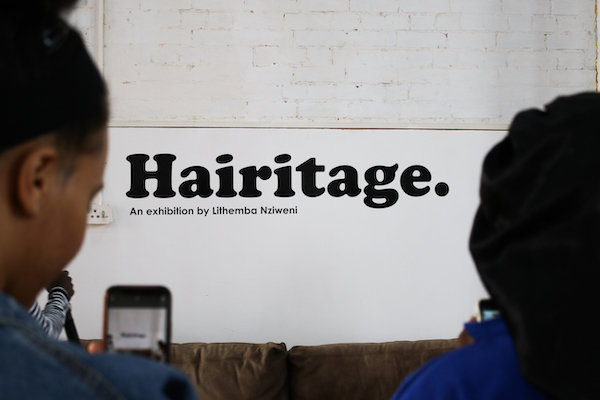By Aphiwe Ngowapi
A remarkable and thought-provoking photography exhibition, proudly sponsored by Lewatle Magazine and featuring Organic Live, recently graced the vibrant art scene at The Black Power Station on 27 and 28 October. The Black Power Station invite the exploration of Black creativity. This was the second edition of the Hairitage exhibition, a celebration and investigation of Black hair. Art enthusiasts were delighted with a captivating blend of visual art, live music, and documentary screening.
The artist, Lithemba Nziweni, talks about the exhibition being, in part, a response to his experiences navigating his hair expression growing up. He said, “I am completely different now compared to when I was a young teenage boy in a Model-C school, in an experimental phase trying to find myself […] you’re in confines with these [predominantly]white schools that are almost telling you, you can do this, and you cannot do this with your hair, a lot of policing of young Black girls and boys [….]When I rocked [up]to school with my hair down, fade, or mohawk, I was told my hair is untidy, unruly and not welcome there, but when Chad, Norman, and Bryson come with a comb-over, it’s fine.”
The industrial venue embodied this spirit and was carefully curated and filled with exceptional and revealing photographs, demonstrating the intricate relationships individuals have with their hair. Through his visual language, Nziweni leads a journey through the tapestry of cultural and historical contexts of hair. The body of work has vibrant and creative strengths attentively paralleled. Performances by Tshego Bennia (who also appears in Nziweni’s new body of work), Zanele Rose, Sam Mavela and Musakeys punctuated the exhibition, curated by Mivuyo Dalasile.
Day two of the exhibition included Dalasile, a Rhodes Fine Art graduate, braiding the hair of a featured artist. Dalasile said, “Initially, we wanted something to do with hair done within the space, and this opportunity presented itself quite well. Everybody has these silent battles that they don’t speak about as Black people, and this is one of them. Getting your hair braided, the amount of time and labour it is.”
One of the exhibition’s highlights was the screening of a documentary, unveiling the compelling stories of the individuals depicted in Nziweni’s work. This documentary provided a deeper context to the Hairitage collection, offering insight into the thoughts and inspirations that drove the creative process. It allowed viewers to connect with the artists and participants on a personal level, further enhancing the emotional resonance of the exhibition and providing a platform for dialogue, self-expression, and cultural celebration. It was a testament to the power of art in fostering connections, promoting diversity, and encouraging conversations about identity and heritage.
Talking about his heritage, Nziweni said: “Going through the transition from boyhood to manhood. That transition comes with a lot of symbolism, in my culture, that is tied to hair. When you go to the kraal to cut off your hair, it is a symbol of the concept of letting go of a particular identity, certain personalities and mannerisms, and all the hair that grows back after is, the hair of a brand new person who has taken up a new identity of manhood.”
Hairitage was first featured in the inaugural issue of Lewatle Magazine in July 2023. The CEO and publisher of Lewatle Magazine, Mapule Mokete, said, “I am back here in Grahamstown because I really love this place, and it made me the creative that I am […] I want it to be a thing that Lewatle features artists and stories from Grahamstown because it’s a creative town.”


